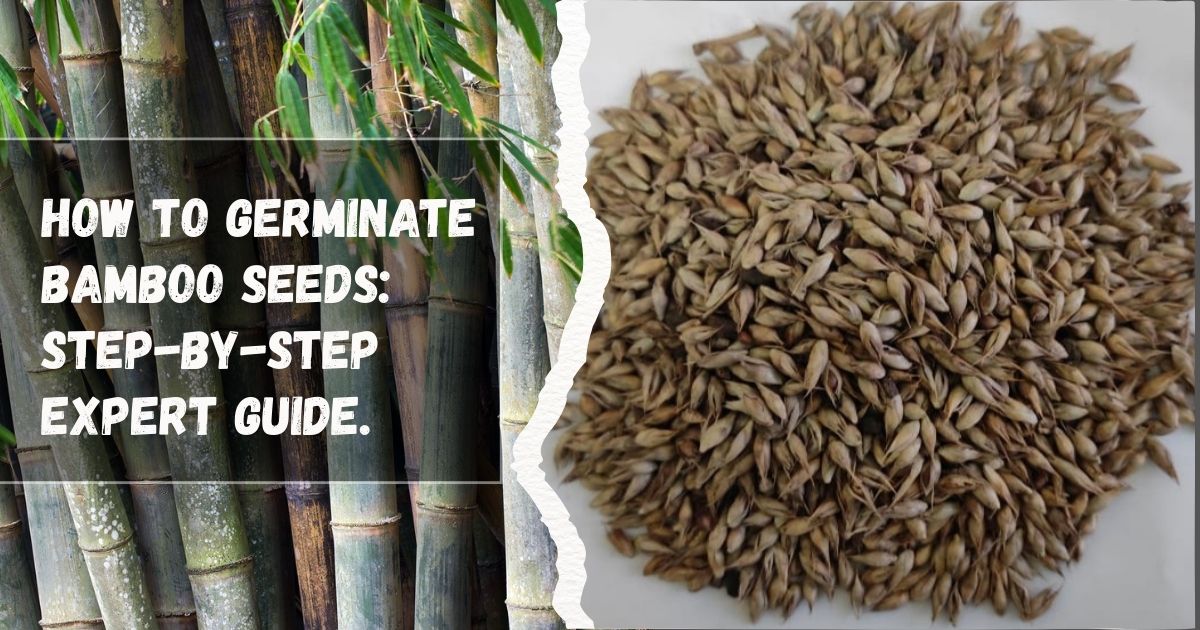How to Germinate Bamboo Seeds: Step-by-Step Expert Guide.
Bamboo is a versatile and fast-growing plant used in landscaping, construction, and crafting. If you want to grow bamboo from seeds, it’s essential to understand the proper germination process. This guide will walk you through the best practices to achieve high germination rates and healthy bamboo seedlings.

Table of Contents
Understanding Bamboo Seeds
Bamboo seeds are unique compared to many other plants. They are often short-lived and require fresh seeds for successful germination. Seed viability can vary depending on the bamboo species, so it’s crucial to source quality seeds from reputable suppliers.
Step-by-Step Bamboo Seed Germination Guide.
1. Seed Selection and Preparation
- Freshness: Use fresh seeds harvested within the past few months.
- Cleaning: Rinse seeds gently to remove any pulp or debris.
- Soaking: Soak seeds in clean water for 24 to 48 hours to soften the seed coat and speed up germination.
2. Choose the Right Growing Medium
- Use a well-draining mix such as a combination of peat moss, sand, and perlite.
- The medium should retain moisture without becoming soggy to prevent seed rot.
3. Planting Seeds
- Sow seeds about ½ inch deep.
- Keep seeds spaced enough for airflow.
- Cover lightly with soil and press gently.
4. Provide Optimal Conditions
- Temperature: Maintain warmth between 20°C to 30°C (68°F to 86°F).
- Humidity: Keep the soil moist but not waterlogged.
- Light: Provide indirect sunlight; bamboo seeds will germinate indoors or in shaded outdoor areas.
5. Watering and Care
- Use a spray bottle to mist water to avoid disturbing seeds.
- Avoid overwatering; maintain consistently moist soil.
- Protect seedlings from strong winds or direct harsh sunlight.
6. Germination Timeline
- Bamboo seeds typically germinate in 7 to 21 days.
- Germination time varies depending on species and environmental factors.
7. Transplanting Seedlings
- When seedlings develop 2-3 true leaves, transplant them to larger pots or the garden.
- Gradually acclimate them to outdoor conditions if started indoors.
Click on the button below for plants or seeds.
Tips for Improving Bamboo Seed Germination Success
Use scarification methods like gently nicking the seed coat for tougher seeds.
Ensure good air circulation to prevent fungal issues.
Avoid using chemical fertilizers on seedlings until well established.
High Quality Bamboo Seeds Available 🎋
— Annadata Trading Company (@ATCSEEDS) September 9, 2025
✅ High Germination Rate.
✅ Best for Farming.
✅ Fast Growth & Strong Plants.
✅ Suitable for All Soil Type
🧑💻Order Now: 👇
🏢 Annadata Trading Company
☎️ 092844 02685 #bambooseed #bamboofarming#bamboogrowing #seeds pic.twitter.com/i0FkMltwgt
Common Problems and Solutions
Incorrect Temperature: Bamboo seeds generally require consistent warm temperatures around 68-78°F (20-25°C), with about 75°F (24°C) being optimal. Avoid fluctuations. Use seedling heat mats and thermometers to maintain steady warmth. Too high or too low temperatures can slow or prevent germination.
Improper Moisture Levels: Seeds need to be kept moist but not soggy. Overwatering can cause seed rot and mold, while underwatering will stop germination. Use misting to keep the growing medium evenly moist and ensure good drainage.
Poor Air Circulation/Oxygen: Bamboo seeds require adequate oxygen for germination. Seeds buried too deep or in compact, wet soil can suffocate. Use an airy, well-draining germination medium such as vermiculite or paper towels. Avoid heavy organic soils.
Presence of Mold and Fungus: High humidity, excess organic matter, or poor hygiene can encourage fungal growth. Removing outer seed bracts before soaking seeds helps reduce mold risk. Use sterile, inert germination mediums and improve airflow. Occasionally mist with diluted hydrogen peroxide solution can help.
Seed Viability Issues: Not all seeds are biologically viable. Remove damaged or deformed seeds before germination. Always use fresh seeds stored properly in cool, dry, airtight conditions.
Slow Germination Species or Seed Dormancy: Some bamboo species, especially mountain types like Fargesia, can take longer to germinate (several weeks to a month). Patience and consistent care are key. For these seeds, paper towel germination can allow better monitoring and adjustment.
Seedling Damage or Weakness: Handle seeds and seedlings gently to avoid injury. Avoid overcrowding when sowing. Provide indirect natural or appropriate grow light once seedlings develop leaves. Do not use harsh direct sunlight or unapproved LED lights.
Pests: Fungus gnats and other pests can harm seedlings. Maintain cleanliness, avoid excessive moisture, and use natural pest deterrents if needed.
Why Grow Bamboo from Seeds?
Genetic diversity: Seed-grown bamboo is more genetically varied than cloned plants.
Cost-effective: Seeds are generally cheaper than nursery-grown plants.
Satisfaction: Growing from seed is rewarding and allows control over growth conditions.
Conclusion
Successful bamboo seed germination depends on using fresh seeds, proper seed preparation, and maintaining optimal warmth, moisture, and airflow. Removing outer seed bracts and using a well-draining medium like vermiculite can improve results. Patience is key, as germination time varies by species. Careful monitoring and balanced conditions help prevent common problems like seed rot and fungal growth. Following these steps leads to healthy bamboo seedlings ready for transplanting and growth.
FAQs
How many bamboo seeds are there in 1 kg?
Typically around 13,000 to 15,000 seeds in 1 kg.What is the germination rate of bamboo seeds?
Generally ranges from 60% to 80%, depending on seed quality and species.How long does bamboo seed germination take?
Usually between 7 to 21 days, but some species may take longer.What is the best soil or medium for germinating bamboo seeds?
A well-draining mix such as peat moss, sand, vermiculite, or a 50/50 perlite-organic substrate mix works well.How should I prepare bamboo seeds before planting?
Remove the fibrous outer bracts and soak seeds in water for 24-48 hours to improve germination rates.What temperature and humidity are ideal for bamboo seed germination?
Maintain temperatures between 20-30°C (68-86°F) with consistently moist but not waterlogged conditions.How do I know when bamboo seeds have finished germinating?
Most seeds sprout within the average germination timeframe; later sprouters can take a few extra weeks and still be viable.Can bamboo seeds go dormant, and how to break dormancy?
Some species exhibit dormancy; scarification or soaking can help break dormancy.
